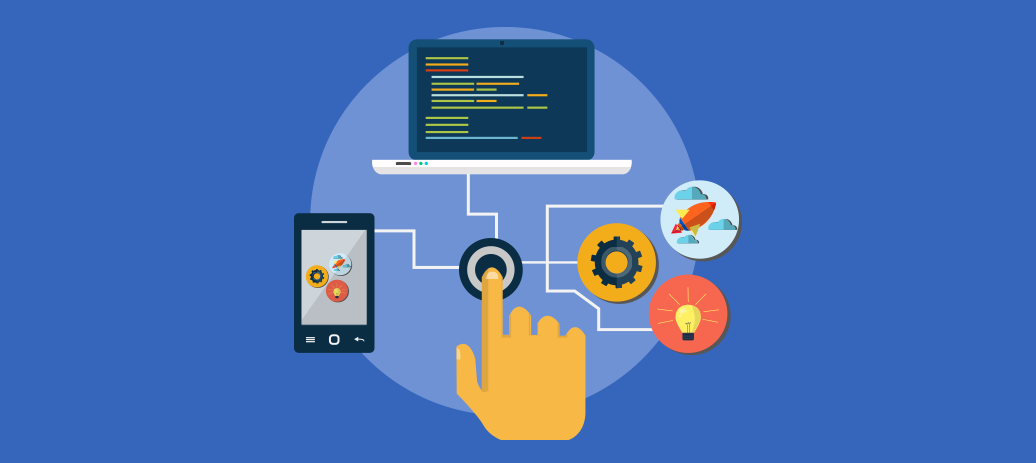
What are the Benefits of Low-Code Development Platforms?
Nearly all companies require customized software, but the traditional software development process is expensive, time-consuming, and requires a significant amount of expertise. This is a problem, but it’s a market opportunity too. It gave rise to several low-code platforms that aim to improve the software development process.
Low-code platforms take a visual approach to app development. They provide drag-and-drop components, connectors to various back-ends and services, and model-driven logic through a graphical user interface. They abstract away some of the more tedious tasks of traditional software development, significantly speeding up the development of all apps.
It’s a trend that should be taken seriously. Gartner predicted in late 2019 that low-code app platforms will create 65% of all apps by 2024 and Forrester said they expect the market for low-code development platforms to be worth over $21 billion by 2022.
This article will answer why so many companies are seriously investigating low-code platforms and how Iterate.ai uses a low-code platform so you can innovate faster and better too.
What are the Benefits of the Low-Code Life?
The biggest benefit of a low-code platform is its ability to speed up app development without too much compromise. A low-code platform is to an app what an assembly line is to a car, where you progressively add parts until it’s a complete product.
These parts are modules of pre-wrapped code that you drag and drop into place. This only works because low-code platforms usually run on microservices, a software architecture philosophy where separate modules of code are built around business services and loosely coupled with one another.
A particularly famous example of an app built in a low-code way is Uber. For their Android app, Uber uses Google’s Geolocation APIs to identify where your device is, Google Maps to figure out routes and directions, Twilio for its text messages, Braintree for payments, and so on…
Uber takes the best of what other companies have already built and combines it all. It seems to have worked quite well for them, to put it mildly. Now can you imagine having to program all these modules on your own? To build Google Maps from scratch? It would cost an almost insurmountable amount of time and money.
The other benefit of low-code platforms that allow you to tap into the APIs of other companies is that these APIs have been thoroughly tested by other people already. Because of this, you’ll spend less time troubleshooting and squashing bugs, speeding up the entire process even more.
All of the above doesn’t mean that you can’t customize apps to your liking. That’s why they’re called low-code and not no-code platforms (which also exist). You can customize each module to make it work exactly as you’d like, which will involve some coding.
What Low Code Means for Iterate
Iterate wants to be the world’s simplest, safest, and speediest way to get innovation done. That’s why we developed Interplay, our middleware platform that allows you to rapidly build and deploy innovation apps.
Interplay has all the benefits of a low-code platform. It speeds up the app development process and it allows you to tap into the APIs of other companies. It also connects to popular databases such as MongoDB, Redshift, and Oracle.
Not only that, but Interplay is cloud-agnostic too. Your modularized components can run on AWS, Google Cloud, Azure, and other clouds, while also working together as part of a bigger app. This means that large enterprises can use Interplay to create apps that draw from the many different technologies they use.
Interplay is low-maintenance too because its multi-threaded kernel makes sure that all components can scale automatically based on load and necessity. Your app will not be hampered by its own success, as all modularized components will scale appropriately and independently. This is possible because Interplay is built with microservices.
With Interplay, you can build mobile apps, API endpoints, web apps, chatbots, IoT apps, and more. It supports multiple different programming languages, such as NodeJS and Python, and it has passed stringent security tests to make sure your app is safe to use.
In Summary
Software on its own no longer provides a competitive advantage over your competitors. The traditional software development process is too expensive and too slow. Iterate’s Interplay platform gives companies the ability to stay agile and respond quickly to market opportunities with dynamic software. If you’d like to better understand how that can benefit your company too, please feel free to contact us.
Our Innovation Blog
Stay ahead of trends with insights from iterate.ai experts and advisors